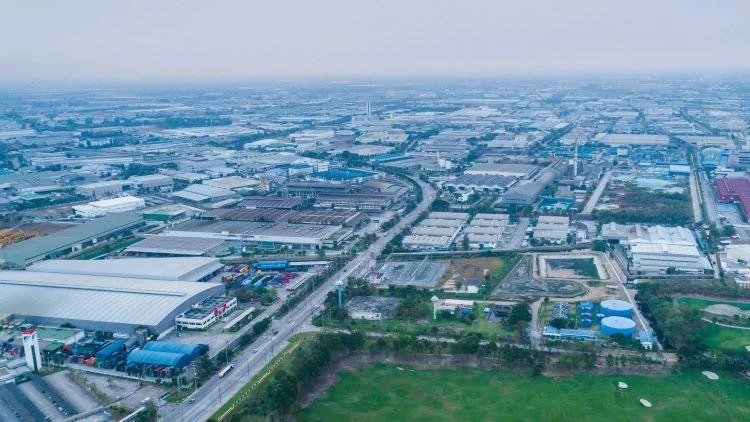
The moves by Chinese companies appear to validate the prediction that Thailand will be a major beneficiary in the region from the U.S.-China trade war. The production shift from China to Thailand will lift the country's output by $1.9 billion, equivalent to 0.4% of its gross domestic product, predicts a June 4 report by Mizuho Research Institute, a Tokyo-based think tank.
Holley Group is one of the major Chinese companies that started moving their production bases to Thailand. The local unit of the Hangzhou-based group started in December building a factory for electricity meters in an industrial estate in Rayong Province developed by Amata, Thailand's largest industrial zone developer. Holley Group Electric Thailand plans to export some of the products to the U.S. as well as Canada and Europe.
Zhongce Rubber Group Thailand, which started building its new factory early this year in Rayong will use rubber latex to produce motorcycle tires. Commercial operation is set to start by the end of 2019, and most of the products are for export to the U.S., Europe and neighboring countries in Southeast Asia.
According to the Board of Investment of Thailand, Chinese investment applications submitted to the government agency have risen 15% so far this year to 503 projects worth 164 billion baht ($5.3 billion). The intensified trade war has been an accelerator for Chinese companies to relocate their production bases, said a senior official at the investment board.
"More than 100 Chinese companies are moving into Amata's industrial estates, starting construction and are expected to start commercial operations soon," said Viboon Kromadit, Amata's chief marketing officer. "Most of them are in the auto, auto-parts and manufacturing sectors."
Amata sold nearly 1.7 million sq. meters of land in its industrial estates in 2018, up by 10% from the previous year and higher than the target of 1.28 million sq. meters. The developer sold several hundred thousand square meters of land to Chinese companies.
Among the 100 companies are wire producer Zhenxiong Copper Thailand and steelmaker Delong Thailand. They enjoy lower tariffs as their production bases are declared as Thailand. Both Zhenxiong Copper and Delong have been in operation in Thailand for years, but the escalating trade war has encouraged them to expand investment in Thailand as most products are for the U.S. market.
At Amata City Rayong, an Amata industrial estate, China now accounts for 36.5% of all companies based there, exceeding Japanese companies, the developer's long-standing customers.
With strong demand from Chinese companies and rising development costs, Amata has raised its land price by 30% from 5,300 baht per sq. meter last year to 6,900 baht.
In January, Amata partnered with Holley Group, which also has industrial estate business to better serve Chinese companies that are relocating their production bases into Thailand by setting up dedicated industrial areas for Chinese investments in Rayong.
Another developer whose sales are set to increase this year on the back of the U.S.-China trade war is WHA.
CEO Jareeporn Jarukornsakul said the company sold more than 1.6 million sq. meters of industrial land in 2018. Chinese companies have bought 40% of the land and Jareeporn expects more to come.
Hong Kong-listed Prinx Chengshan Shandong Tire at the end of March held a groundbreaking ceremony for its first-ever overseas plant at a WHA industrial estate in Chonburi Province. In the initial phase, the company plans to invest $300 million to produce 4 million passenger car tires and 800,000 truck tires annually from mid-2020.
The tire maker chose to move production bases into Thailand to avoid higher tariffs from the U.S. as its trade spat with China has intensified, according to the investment board official.
To respond to the trend, Thai Deputy Prime Minister Somkid Jatusripitak has set up a task force through the investment board to more aggressively attract Chinese companies to Thailand.




















